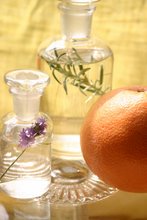Black Raspberries Slow Cancer By Altering Hundreds Of Genes: "ScienceDaily (Aug. 27, 2008) — New research strongly suggests that a mix of preventative agents, such as those found in concentrated black raspberries, may more effectively inhibit cancer development than single agents aimed at shutting down a particular gene...Researchers at the Ohio State University Comprehensive Cancer Center examined the effect of freeze-dried black raspberries on genes altered by a chemical carcinogen in an animal model of esophageal cancer...The carcinogen affected the activity of some 2,200 genes in the animals’ esophagus in only one week, but 460 of those genes were restored to normal activity in animals that consumed freeze-dried black raspberry powder as part of their diet during the exposure...“We have clearly shown that berries, which contain a variety of anticancer compounds, have a genome-wide effect on the expression of genes involved in cancer development,”...Stoner notes that black raspberries have vitamins, minerals, phenols and phytosterols, many of which individually are known to prevent cancer in animals...“Freeze drying the berries concentrates these elements about ten times, giving us a power pack of chemoprevention agents that can influence the different signaling pathways that are deregulated in cancer,” he says...“What’s emerging from studies in cancer chemoprevention is that using single compounds alone is not enough,” Stoner says. “And berries are not enough. We never get 100 percent tumor inhibition with berries. So we need to think about another food that we can add to them that will boost the chemopreventive activities of berries alone.”..."
Another part of the equation must surely be the chemoprevention found in cruciferous vegetables - such as sulforaphanes in broccoli.
DogVitals powerful antioxidant supplement for dogs - helping dogs live a younger, healthier life
Thursday, August 28, 2008
Black Raspberries Slow Cancer By Altering Hundreds Of Genes
Labels:
berries,
black rasberries,
cancer,
chemoprevention,
gene expression,
phenols,
phytosterols
Subscribe to:
Post Comments (Atom)

No comments:
Post a Comment